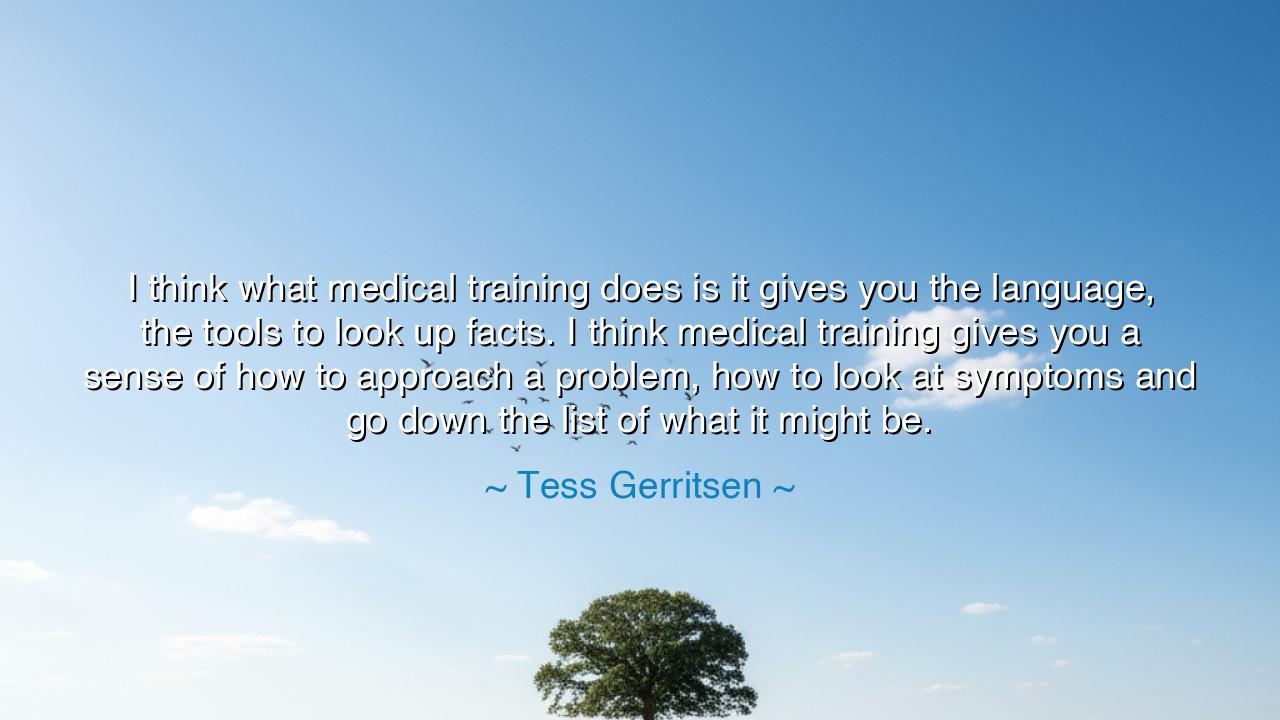
I think what medical training does is it gives you the language
I think what medical training does is it gives you the language, the tools to look up facts. I think medical training gives you a sense of how to approach a problem, how to look at symptoms and go down the list of what it might be.






In the words of Tess Gerritsen, both healer and storyteller, there echoes a wisdom that transcends the walls of hospitals and the pages of books: “I think what medical training does is it gives you the language, the tools to look up facts. I think medical training gives you a sense of how to approach a problem, how to look at symptoms and go down the list of what it might be.” These are not mere words about medicine; they are a reflection on the deeper art of understanding, the sacred discipline of seeing patterns where others see chaos. For medicine, at its heart, is not only the healing of the body — it is the cultivation of a way of thinking, of feeling, of perceiving truth amid confusion.
To be trained in medicine is to learn the language of life itself. The human body speaks in whispers — in the rise of a fever, in the trembling of a hand, in the faint murmur of a failing heart. The physician learns to listen, not merely with the ear, but with the soul. Medical training grants not only facts, but a grammar of discernment — a way of reading the signs of existence as if each symptom were a syllable in the grand poem of life. Tess Gerritsen, who once walked the corridors of healing before she turned her gift toward writing, speaks from that union of science and art, reminding us that true wisdom begins not with answers, but with the humility to ask, What is happening here?
She speaks also of the tools — not the steel instruments of surgery, nor the stethoscope, but the invisible tools of reason and inquiry. To “look up facts” is not merely to seek knowledge, but to understand the path toward knowledge. The doctor does not depend solely on memory, for memory fades; rather, she learns how to search, how to question, how to trace the lineage of a symptom back to its source. This is the deeper power of training — to teach not only what to think, but how to think.
There is a tale from the life of Hippocrates, the ancient physician of Kos. A desperate family once brought before him a man stricken by strange and sudden convulsions. The healers before him had called it a curse, a punishment from the gods. But Hippocrates, guided by the sacred method of observation, knelt beside the man and studied him — his breath, his eyes, his trembling limbs. He saw not divine wrath, but imbalance within the body. And so, by approaching the problem with method and reason, he uncovered the truth: what men had called “sacred disease” was but epilepsy. Thus was born the dawn of medical understanding — not through miracle, but through discipline.
This is the very spirit of Tess Gerritsen’s words. For she, too, knows that healing lies not in magic but in method — that to face uncertainty is to walk a path of logic tempered by compassion. Every problem, whether in medicine or in life, reveals itself through its symptoms. And the wise do not despair when the symptoms appear; they follow them, patiently, step by step, down the list of possibilities until clarity dawns. Such is the physician’s art — and such is the philosopher’s, the writer’s, the seeker’s art as well.
But there is a hidden depth in her message — for Gerritsen herself left medicine to write stories that explored the human condition. She saw that the same tools which diagnose illness could diagnose the soul. In her novels, characters wrestle not only with disease, but with guilt, fear, and moral decay. Thus, she reveals that the approach to problems — the careful weighing of evidence, the attentive listening to signs — is not only for doctors. It is for all who would live wisely. For life itself presents its symptoms: anxiety, conflict, confusion — and we must learn to trace them to their causes with the same calm precision as a healer tracing pain to its source.
So, my children, learn from this: training is not merely knowledge; it is a discipline of mind and heart. In every art, in every calling, you must learn to listen before you speak, to observe before you act, to reason before you judge. Whether you are a doctor diagnosing a patient, or a soul seeking peace, the path is the same — look closely, think deeply, and proceed with humility.
And finally, remember the greatest lesson of all: understanding begins with attention. The world, like the human body, is full of symptoms — of suffering, of imbalance, of beauty longing to be noticed. Learn the language of life, sharpen the tools of thought, and when you encounter confusion, do as Tess Gerritsen counsels: approach the problem with patience, follow the signs, and never cease to seek the truth — for that, in every field and every age, is the art of healing.






AAdministratorAdministrator
Welcome, honored guests. Please leave a comment, we will respond soon